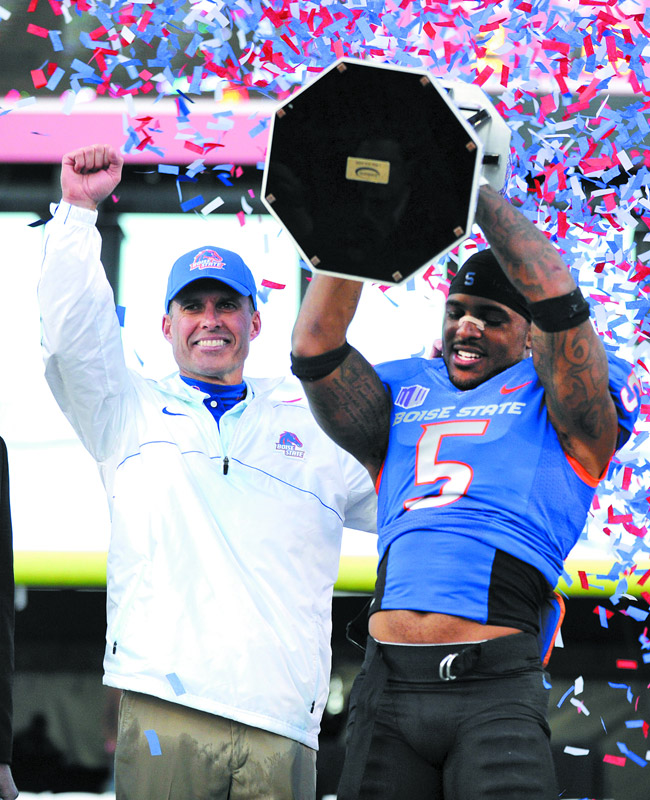Coach’s Move Impacts Entire Conference

Former Boise State coach Chris Peterson (with cornerback Jamar Taylor) has created a mid-major monster that has increased the fortunes of the school and the Mountain West Conference. His move to Washington puts much of that in peril | AP Photo/David Becker
Wherever UH fans gather, a collective cheer no doubt went up when it was reported Chris Peterson had agreed to be Washington’s next head football coach. The celebration was likely just as short-lived when it also was realized UH would open 2014 against Washington and that familiar, frustrating coach.
It seems Boise State and, by extension, Peterson, has been a thorn in UH’s side ever since the Broncos joined the Western Athletic Conference in 2002. The former Division II and Division I-AA power entered the WAC and, to the horror of everyone outside of Idaho, won eight conference titles in nine years. The abuse continued as both schools moved to the Mountain West.
Locally, champagne corks popped when Boise announced it was moving to the Big East. The bubbly
suddenly went Charlie Comisky flat when, buoyed by a new TV agreement and a change in bowl game revenue sharing, Boise reversed course and returned from where it came. The calm lasted just two years. With the departure of Peterson to the Pac-12, UH is faced with its biggest financial threat since its last days in the WAC.
Boise has been the conference’s cash cow and only recognizable brand since it entered the Mountain West in 2012. Its place atop the conference hierarchy was solidified when the conference welcomed Boise’s return after the Broncos reneged on their promise to join the Big East (now American Athletic) Conference.
Much like Texas in the Big 12, Boise State was just too valuable to lose, and those in charge gave concessions to keep its biggest breadwinner happy. This didn’t make everyone happy, but it did create additional revenue streams from which everyone could benefit – if they were good enough.
With Boise being neither in the Mountain West nor the Big East, the Mountain West was able to exempt Boise from its current TV contract and sell the rights to its games to another network, i.e., ESPN. The Mountain West did just that.
As part of the agreement with ESPN, any conference team that plays on a national broadcast (defined as on a network of 90 million or more U.S. homes) will receive a $300,000 bonus. Saturday games come with a $500,000 bump.
Hawaii’s disastrous 1-11 season kept it off the national airwaves and as a result the school (along with Colorado State and UNLV) was shut out of the bonus money. Boise, Fresno and Wyoming all got $1 million or more in bonuses, with San Diego State getting $800,000, San Jose State $600,000, New Mexico $500,000, and Air Force, Utah State and Nevada getting $300,000.
That was then.
Boise State without Chris Peterson is the great unknown. Peterson has been Boise’s offensive coordinator or head coach since 2001, winning 145 of 168 games while raising the profile of mid-major programs all over the country. Boise doesn’t have to match Peterson’s record, but a drop to mediocrity would be felt throughout the conference.
It took UH years to separate itself from the sinking ship that was the WAC. Only after shifting most of its roster to the cheaper but less enticing Big West and paying a pirate’s ransom to get its football team into Mountain West, was UH able to find a safe home for its athletic programs. But that arrangement remains precarious.
UH’s finances are a mess and a non-competitive football team would be a financial drain on the conference. A lessened Boise would further challenge the Mountain West’s ability to generate TV revenue and threaten conference stability, as the most financially healthy programs will begin searching for new homes.
Will the departure of Chris Peterson effectively kill the Mountain West Conference? Not likely. But the absence of his success, and the money it creates, could push an already mediocre conference further into economic peril.
smurray@midweek.com
Twitter @SteveMurray84





